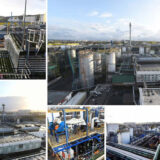
Lubrizol CV1150 achieves China’s GB D1 engine oil standard
Lubrizol’s CV1150 heavy-duty engine oil solution has successfully met the GB D1 specification—China’s first independently developed diesel engine oil standard. This milestone underscores Lubrizol’s ongoing leadership in engine oil technology and its commitment to the evolving demands of China’s commercial vehicle sector.
The GB D1 standard is based on four localised engine bench tests and reflects growing pressure for emission control and efficiency in China’s transport industry. It places particular emphasis on oxidation stability, wear protection, and compatibility with aftertreatment systems—attributes that are increasingly critical as OEMs align with the country’s “dual carbon” goals and the tightening China VI and VII emissions frameworks.
Developed from the globally recognised API CK-4 benchmark, Lubrizol® CV1150 employs a low-ash formulation designed to meet China VI requirements while proactively supporting China VII system protection. In road testing over 100,000 kilometres, the lubricant maintained stable oil quality throughout, with component inspections showing minimal wear and deposit build-up. Notably, CV1150 helped reduce ash accumulation in diesel particulate filters (DPFs), extending maintenance intervals.
Henry Liu, vice president of Lubrizol Asia-Pacific, highlighted the significance of achieving both GB D1 and API CK-4 approvals. “As the commercial vehicle industry moves toward low-carbon and intelligent transformation, and China’s regulatory framework continues to converge with international standards, Lubrizol remains committed to continuous innovation, supporting industry partners in building sustainable competitiveness.”
Lubrizol’s CV1150 platform builds on the company’s long-standing expertise in additive innovation and extended-drain interval technology. The formulation’s modular design allows for OEM customisation and supports lubricant manufacturers in delivering differentiated, high-performance products. The company sees this as part of a broader shift towards improved fuel economy and reduced carbon emissions in commercial transport.












